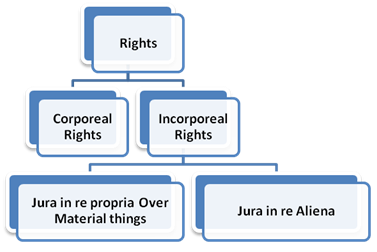Section – 13. Facts relevant when right or custom is in question

Section – 13 of Evidence Act – Facts relevant when right or custom is in question
- Section 13 deals with the facts as to proof of existence of any right or custom. When any question as to the existence of any right or custom is in issue the following facts under clause (a) and clause (b) are relevant:
- Clause (a): Any transaction by which the right or custom in question was,—
- created
- claimed
- modified
- recognized
- asserted or
- denied or
- which was inconsistent with its existence
- Clause (b): Particular instance in which the right or custom was:
- claimed or
- recognized, or
- exercised or in which its existence was
- disputed
- asserted, or departed from, is relevant
- The Section 13 applies all kinds of right so far recognized by the rule of law. For example corporeal and incorporeal rights, public and private rights, antecedent and remedial right, perfect and imperfect rights etc.

Section – 13 of Evidence Act – Facts relevant when right or custom is in question
- Corporeal Right – is the right of ownership in material things.
- Examples – Right of possession , Right of ownership
- Incorporeal rights are rights that can’t be seen or touched, but are still enforceable by law. Generally, incorporeal rights have to do with intangible property such as copyrights, licenses, rights-of-way and easements
- A custom means those principles which have received recognition and acceptance as principles of justice and public utility.
- A custom is generally taken to mean the particular rule of a family, a locality or a district which has existed from the time immemorial or from long usages and has obtained the force of law. The requirement of long usage in essential and the practice must be shown to have continued in such circumstances and for such length of time that it has come to be exercised as of right.
- Requisite conditions of valid custom
- It must be ancient
- It must be continuous and conform
- It must be peaceable.
- It must be certain, define and constant.
- It must be compulsory and not optional.
- It must not be against morality or public opinion
- It must be reasonable.
- It must not be expressly forbidden by law or statute.
- Proof of Custom:
- Under section 13 the proof of existence and non-existence of custom may be done either: (1) by transaction or (2) by instances.
- The Constitution of India, under Article 13, treats customary law along with other branches of civil law. A custom or usage if proved would be law in force under this article. These customary rights having the force of law can be taken judicial notice by courts under Section 57 of the Indian Evidence Act 1872
- A judgment not inter-parties is admissible in proof of a transaction or a particular instance in which the relationship was asserted, recognized or denied.








No comment